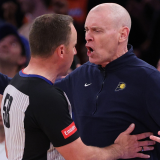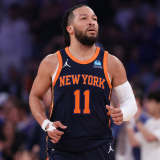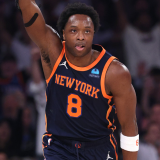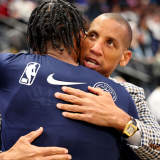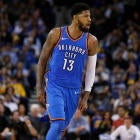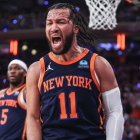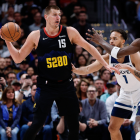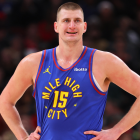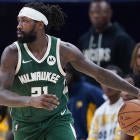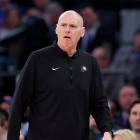Free agency is officially underway, and the first domino has fallen: Paul George isn't going anywhere. Just about as soon as free agency officially began, the five-time All-Star made a major commitment to the franchise that made a risky move to trade for him this time last year.
Here are our extremely early takeaways:
Scared money don't make no money
Despite more than a year of flirting with the idea of joining his hometown Los Angeles Lakers, George intends to re-sign with the Oklahoma City Thunder, as first reported by ESPN's Adrian Wojnarowski. Such a decision is an enormous victory for the Thunder organization, which would have had to consider a total teardown had he left. It's also a big bet by George on Sam Presti's front office, which now needs to figure out how to get the most it possibly can out of the next couple of years.
George will reportedly sign a four-year maximum deal with a player option for the final season. This would allow him to become a free agent again as a 31-year-old in the summer of 2021. More importantly, he will be an 11-year veteran by then, opening up the possibility of a max contract worth 35 percent of the salary cap. In other words, Oklahoma City can celebrate this at Russell Westbrook's house party, but as soon as it ends, management will be on the clock.
Presti has a three-year window to turn a team that won 48 games and lost to the Utah Jazz in the first round into a true championship contender. Re-signing George and re-signing the athletic and versatile Jerami Grant pushed the Thunder's salary toward almost $167 million next season, which would result in a luxury-tax bill of almost $130 million. That is not a reasonable amount of money to pay for a roster that is merely pretty good, so there must be internal belief that they can improve.
In the short term, there are several unknowns, starting with the status of $28 million man Carmelo Anthony. He was not a helpful player for Oklahoma City this past season, and at the end of it he told reporters that he didn't think he could be effective in the role he was playing and would not consider coming off the bench. Anthony could give it another go, negotiate a buyout or be traded.
Beyond Anthony, the Thunder might have significant turnover on the bench. Reserves Raymond Felton, Corey Brewer and Josh Huestis are also free agents. Given the salary-cap situation, it might not even be safe to assume they will use their $5.3 million midlevel exception to strengthen the roster.
Typically, teams with a payroll like this are able to attract ring-chasing veterans who are willing to take discounts. It is unclear, though, if Oklahoma City will be able to sell anybody on that. Over the next couple of years, Presti's front office will need to be creative and/or lucky. Can the 20-year-old Terrance Ferguson become a difference-maker? Did the Thunder hit on their second-round picks with Devon Hall and Kevin Harvey? Can Patrick Patterson have a bounceback season? All of these questions are important, and there might need to be systemic changes, too.
Oklahoma City's defense should improve next season if Andre Roberson is healthy for the majority of it. The more fascinating variable is the offense, which was inconsistent and underwhelming considering the talent on the roster. George is obviously counting on Presti here, but Billy Donovan's coaching staff should enter next season thinking big. Westbrook, George and Steven Adams theoretically complement each other, and there are lots of franchises that would kill to have them as a Big 3. They need, however, to operate in a system that maximizes their abilities. This means, quite simply, fewer contested, inefficient shots from Westbrook, better spacing and more ball movement.
As the free-agent frenzy begins, the Thunder are unquestionably big winners. They have been seen as the underdogs to retain George ever since they were bold enough to acquire him a year ago, and silly people like me thought their playoff loss sealed his exit. This agreement is one of the biggest moments in Oklahoma City history, and it got him for longer than anyone thought, without the Lakers even getting a meeting.
If this franchise is going to get where George wants to go, though, there is plenty of work to do.
Durant does the expected
Kevin Durant has said for months that he wasn't going anywhere. The news was always going to be how long he committed to the Golden State Warriors. As first reported by The New York Times' Marc Stein, Durant will sign a two-year deal with a player option on the second season. He will make $30 million next season and then either hit free agency a year from now or opt into $31.5 million in 2019-20.
The salary-cap implications are pretty simple: The Warriors save $5.65 million next season. If he had used his early-Bird rights, he could have signed for the full max of $35.65 million, but that would have meant he'd have to accept a two-year deal with no options. Either he decided to do Golden State a favor or, more likely, he wanted the flexibility to leave a year from now.
It seems a little crazy to imagine Durant leaving this superteam based on how dominant the Warriors have been with him in the fold. A lot can change in a year, though, and next summer's free-agent class is going to be extremely interesting.
Barton sets the tone?
Will Barton has agreed to a four-year deal worth more than $50 million to stay with the Denver Nuggets, according to Yahoo Sports' Chris Mannix. This takes one of the better second-tier free agents off the market, and it might set the tone for how guys like him need to handle their business this summer. There are hardly any teams with real cap space out there, so re-signing with Bird rights is more appealing than it would be in a normal offseason.
Barton probably wanted a bit more than $12.5 million per season. If he had played hardball, Denver might have dared him to find a team willing to pay him more than the $8.6 million non-taxpayer midlevel extension. In this situation, a four-year deal at this number represents a reasonable outcome.
Now the Nuggets have to figure out how to shed some salary. As currently constructed, with Nikola Jokic's reported five-year, $148 million max contract, they have more than $156 million in salary and a luxury-tax bill of more than $40 million.
The Ariza stunner
Aside from the length of George's contract, the only truly stunning thing that has happened is Trevor Ariza agreeing to a one-year, $15 million deal with the Phoenix Suns, according to Yahoo Sports' Shams Charania. Ariza was a crucial part of the league's second-best team last season, and he was a big reason why they were able to push the Warriors to the brink in the Western Conference finals.
For the Suns, this deal makes sense in the context of management wanting to be competitive next season while preserving future flexibility. Ariza is a -- pardon the cliche -- winning player, and Phoenix needs his 3-and-D skill set on the roster. At 33 years old, he probably won't be there for the long haul, but the organization clearly hopes he can help bring them to respectability. Given how Devin Booker felt at the end of this past season, this looks like the type of acquisition that would make him happy.
You have to wonder how Ariza's negotiations with Houston went. This hurts the Rockets, and it will be hard to replace him. It also makes the re-signing of forward Luc Richard Mbah a Moute, an unrestricted free agent, even more crucial. If they don't get that done, their stellar defense could deteriorate.
Dallas rents DAJ
In another one-year deal, DeAndre Jordan is (finally) going to the Dallas Mavericks. He will reportedly make around $24 million, which is what he would have made had he picked up his player option with the Los Angeles Clippers. My take: This makes way more sense than signing him to a long-term deal.
The Mavs obviously wanted a center, and Jordan is one of the best on the market. He will play excellent defense, and he will be a great pick-and-roll partner for Dennis Smith and Luka Doncic. I didn't love the idea of signing him for three or four years, though, because he is turning 30 in three weeks and Smith and Doncic are 20 and 19 years old, respectively.
You could argue that, in the bigger picture, Dallas would have been better served by using its cap space to absorb a bad contract and acquire future picks. I don't necessarily disagree, but I understand why the Mavs went this direction. Jordan will provide structure for the guards, solidify the starting lineup and make what might be Dirk Nowitzki's final season much more interesting. Dallas definitely wasn't going to tank, especially after trading away their 2019 pick (protected Nos. 1-5) in order to acquire Doncic on draft night.
The CP3 compromise (of sorts)
When Chris Paul orchestrated his opt-in-and-trade deal that landed in him Houston last year, it was widely assumed that it came with a handshake deal on a five-year maximum contract this summer. Evidently, that was not the case: The minute that free agency officially started, ESPN's Adrian Wojnarowski reported that Paul and the Rockets had agreed to a four-year, $160 max deal.
For a 33-year-old point guard heading into his 14th season, this should be seen as a win, not some sort of huge compromise. Paul will make $43.8 million in the 2021-22 season and his contract will expire at the same time as James Harden's. There is risk in Houston committing that kind of money to him, but the organization just has to hope he ages like Steve Nash (whose drop-off came at age 38 because of a nerve injury in his back) and John Stockton (who played all 82 games in his 19th and final season and retired at the age of 41).
If Paul isn't quite worth the money in a few years, then this is the simply the cost of retaining a Hall of Fame-caliber player and chasing a championship. Houston might have preferred to put a team option on that final season or paid him slightly less than the max, but avoiding a five-year deal should be seen as a success for Daryl Morey's front office.









